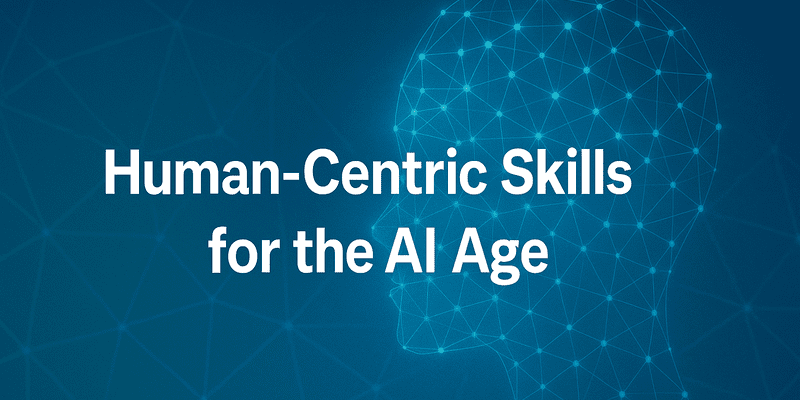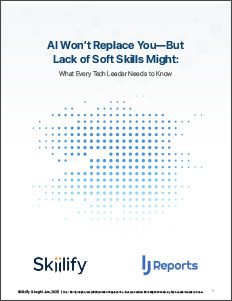6 Must-Have Human-Centric Skills for the AI Age

Tim King offers 6 must-have human-centric skills for the AI age based on proprietary research, part of Solutions Review’s coverage on the human impact of AI.
As artificial intelligence reshapes the workforce at lightning speed, a new truth is becoming undeniable: The future of work isn’t just about mastering machines—it’s about what makes us human.
For decades, success in tech was defined by hard skills: coding languages, system architecture, algorithmic thinking, and now, prompt engineering. But as generative AI, automation, and AI agents rapidly take over routine tasks—even in advanced technical roles—those hard skills alone are no longer enough. What now separates the most effective teams and professionals is something far less tangible, yet infinitely more critical: human-centered skills in the AI age.
Skills like curiosity, resilience, perspective-taking, and humility have moved from the margins of performance to the center of competitive advantage. These soft skills—often undervalued in engineering-driven cultures—are now essential for collaboration, adaptation, ethical reasoning, and problem-solving in a world defined by uncertainty and accelerated change.

This article is a wake-up call for tech leaders, HR strategists, and AI transformation teams. It outlines the six must-have human-centered skills that will define success in the coming decade—and offers a roadmap for closing the gap before it widens.
If your team is racing to implement AI but not investing in human readiness, you may be building brilliance on a brittle foundation.
Must-Have Human-Centric Skills for the AI Age
The AI Paradox: Why Human Skills Matter More Than Ever
“AI won’t replace you—but lack of soft skills might.”
As automation, LLMs, and AI agents reshape technical workflows, the uniquely human abilities to adapt, empathize, and communicate have become the new competitive edge. In high-stakes environments where ambiguity, cross-functional collaboration, and ethical questions are constant, these skills enable resilience and forward motion.
Soft skills are no longer just “nice to have.” They are now core to survival in fast-moving, AI-enhanced organizations.
Survey Insights: A Critical Skills Gap in Tech
In our recent study of 217 tech professionals:
-
93 percent of respondents agreed that soft skills will be more important than ever in an AI-driven future.
-
Yet 71 percent reported having no structured way to assess or improve these skills on the job.
-
Most respondents cited lack of time, coaching, or actionable feedback as the main barriers to human-centered skill development.
-
Many tech leaders acknowledged they are underestimating AI’s impact on their own roles—further delaying soft-skill prioritization.
The 6 Must-Have Human-Centered Skills for the AI Age
Not all soft skills are created equal. While emotional intelligence, communication, and adaptability remain important, our research—guided by renowned organizational psychologist Dr. Paula Caligiuri, PhD—identified six human-centered competencies as the most urgent and high-impact for professionals operating in AI-integrated environments.
These aren’t generic workplace niceties. These are the skills that will differentiate the human workforce in a future where technical tasks are increasingly delegated to machines. They empower individuals and teams to thrive amid uncertainty, drive innovation through collaboration, and maintain ethical and strategic clarity when AI introduces complexity and ambiguity into decision-making.
Here’s a closer look at the six:
Curiosity
In an era of rapid AI evolution, curiosity is a survival mechanism. Curious professionals are the first to ask questions, challenge assumptions, and explore new tools, systems, and ideas. They’re not afraid to step outside their domain, learn continuously, and experiment with emerging technologies. Curiosity fuels agility and ensures that individuals don’t just cope with AI disruption but grow as a result.
Resilience
AI adoption brings change—sometimes fast, sometimes chaotic. Resilience is the ability to maintain energy, focus, and momentum when faced with setbacks, stress, or volatility. Resilient team members recover quickly, remain composed under pressure, and help stabilize their peers during uncertain transitions. In organizations navigating digital transformation, resilience is a foundational trait of high-performance cultures.
Tolerance for Ambiguity
AI doesn’t just solve problems—it introduces entirely new kinds of them. In complex, high-stakes environments where data is incomplete or evolving, tolerance for ambiguity becomes a superpower. Those who can operate without needing all the answers—who can assess risk, weigh possibilities, and stay engaged when things are unclear—will lead the way in interpreting what AI enables and what it should enable.
Perspective-Taking
AI raises ethical, operational, and interpersonal questions that require more than technical skill—they require empathy and multidimensional thinking. Perspective-taking is the ability to understand problems from multiple viewpoints: a colleague’s, a customer’s, a stakeholder’s, or even the AI system’s impact on marginalized groups. This skill fuels better collaboration, more inclusive outcomes, and wiser decision-making.
Relationship-Building
As generative tools handle more transactional interactions, the quality of human-to-human relationships will become the true currency of influence and leadership. Relationship-building means fostering trust, psychological safety, and mutual support across teams. It enables smoother cross-functional collaboration, enhances knowledge-sharing, and reinforces company culture—even when remote or hybrid dynamics dominate.
Humility
In a landscape where no one can predict exactly how AI will evolve—or how fast—humility is perhaps the most underappreciated skill. It’s the willingness to say, “I don’t know,” to ask questions, to take feedback, and to defer to others’ expertise. Humility in leadership opens space for innovation, psychological safety, and ethical reflection. It also mitigates the arrogance that can lead to misuse or overtrust in AI tools.
Why These Skills Are Hard to Teach—and How to Fix That
Despite their importance, these skills are rarely built into performance frameworks, upskilling programs, or AI transformation plans. Most teams still equate AI readiness with technical proficiency.
To close the gap, tech leaders must:
-
Create structured opportunities for feedback on human-centered behaviors.
-
Incentivize soft skill development as part of promotion criteria and reviews.
-
Model these skills at the leadership level—especially humility and ambiguity tolerance.
-
Pair AI training with human-centered coaching to help teams adapt holistically.
Important: AI Won’t Replace You, But Lack of Soft Skills Might – Get Report
Take the Next Step: Help Shape the Future of AI-Ready Workforces
We’re currently conducting a follow-up study to deepen our understanding of the human-AI skills gap—and we need your input.
📝 Take the survey now to contribute your perspective and help define the next wave of workforce readiness.
The Future Is Not Just Technical—It’s Human
The best technologists of the future will not simply know how to build, prompt, or deploy AI. They’ll know how to work with others, weather change, and see the bigger picture.
Human-centered skills are the foundation of that future.
And the time to start building them—systematically, strategically, and sincerely—is now.
Note: These insights were informed through web research and generative AI tools. Solutions Review editors use a multi-prompt approach and model overlay to optimize content for relevance and utility.



